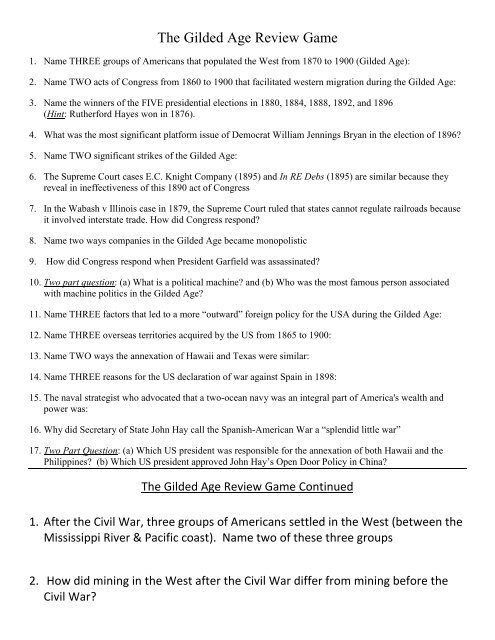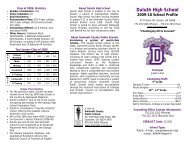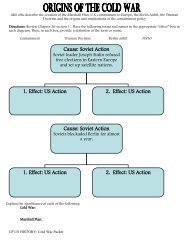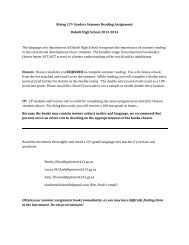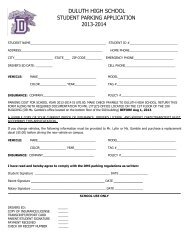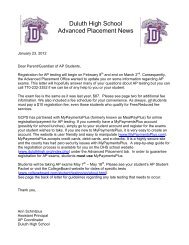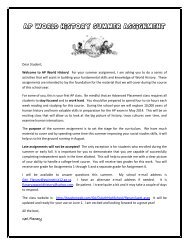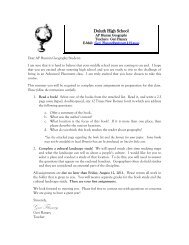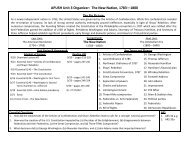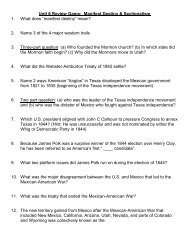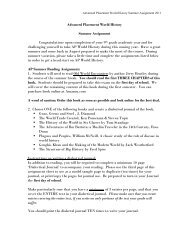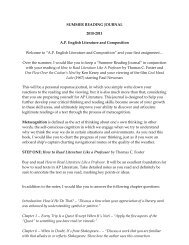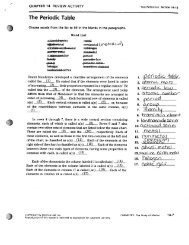The Gilded Age Review Game - Duluth High School
The Gilded Age Review Game - Duluth High School
The Gilded Age Review Game - Duluth High School
You also want an ePaper? Increase the reach of your titles
YUMPU automatically turns print PDFs into web optimized ePapers that Google loves.
<strong>The</strong> <strong>Gilded</strong> <strong>Age</strong> <strong>Review</strong> <strong>Game</strong><br />
1. Name THREE groups of Americans that populated the West from 1870 to 1900 (<strong>Gilded</strong> <strong>Age</strong>):<br />
2. Name TWO acts of Congress from 1860 to 1900 that facilitated western migration during the <strong>Gilded</strong> <strong>Age</strong>:<br />
3. Name the winners of the FIVE presidential elections in 1880, 1884, 1888, 1892, and 1896<br />
(Hint: Rutherford Hayes won in 1876).<br />
4. What was the most significant platform issue of Democrat William Jennings Bryan in the election of 1896?<br />
5. Name TWO significant strikes of the <strong>Gilded</strong> <strong>Age</strong>:<br />
6. <strong>The</strong> Supreme Court cases E.C. Knight Company (1895) and In RE Debs (1895) are similar because they<br />
reveal in ineffectiveness of this 1890 act of Congress<br />
7. In the Wabash v Illinois case in 1879, the Supreme Court ruled that states cannot regulate railroads because<br />
it involved interstate trade. How did Congress respond?<br />
8. Name two ways companies in the <strong>Gilded</strong> <strong>Age</strong> became monopolistic<br />
9. How did Congress respond when President Garfield was assassinated?<br />
10. Two part question: (a) What is a political machine? and (b) Who was the most famous person associated<br />
with machine politics in the <strong>Gilded</strong> <strong>Age</strong>?<br />
11. Name THREE factors that led to a more “outward” foreign policy for the USA during the <strong>Gilded</strong> <strong>Age</strong>:<br />
12. Name THREE overseas territories acquired by the US from 1865 to 1900:<br />
13. Name TWO ways the annexation of Hawaii and Texas were similar:<br />
14. Name THREE reasons for the US declaration of war against Spain in 1898:<br />
15. <strong>The</strong> naval strategist who advocated that a two-ocean navy was an integral part of America's wealth and<br />
power was:<br />
16. Why did Secretary of State John Hay call the Spanish-American War a “splendid little war”<br />
17. Two Part Question: (a) Which US president was responsible for the annexation of both Hawaii and the<br />
Philippines? (b) Which US president approved John Hay’s Open Door Policy in China?<br />
<strong>The</strong> <strong>Gilded</strong> <strong>Age</strong> <strong>Review</strong> <strong>Game</strong> Continued<br />
1. After the Civil War, three groups of Americans settled in the West (between the<br />
Mississippi River & Pacific coast). Name two of these three groups<br />
2. How did mining in the West after the Civil War differ from mining before the<br />
Civil War?
3. Which group of Western Americans most used the “open range” and was hurt<br />
by the introduction of barbed wire?<br />
4. What was the Homestead Act of 1862?<br />
5. One group of western farmers was called “exodusters”. What is an exoduster?<br />
6. Name two ways railroads changed from the era before the Civil War to the<br />
<strong>Gilded</strong> <strong>Age</strong><br />
7. <strong>The</strong> expansion of railroads after the Civil War was helped by two groups: the<br />
national government and immigrants. Explain how both groups helped expand<br />
railroads<br />
8. Name three ways western expansion during the <strong>Gilded</strong> <strong>Age</strong> impacted Native<br />
Americans (Plains Indians)<br />
9. What was the final Indian battle in American history? (Hint: in 1890, the U.S.<br />
military slaughtered over 200 Sioux after the Indians’ refusal to end their “ghost<br />
dance” rituals)<br />
10. Western farmers faced serious problems during the <strong>Gilded</strong> <strong>Age</strong>, which led to<br />
the Populist movement. Name two problems faced by western farmers after<br />
the Civil War<br />
11. Who were the Grangers?<br />
12. One of the reforms proposed by the Populist Party was bi-metalism. What is bimetalism<br />
and what it the advantage for Populists?
13. Who were the Populists and name two things they demanded during the<br />
<strong>Gilded</strong> <strong>Age</strong>?<br />
14. Who was William Jennings Bryan?<br />
15. Two part question: (a) One of the reasons for the boom in industry during the<br />
<strong>Gilded</strong> <strong>Age</strong> was invention. Name two new inventions of this era. (b) Which<br />
American was so famous for his inventions that he earned the nickname the<br />
“Wizard of Menlo Park”?<br />
16. Four major industries helped push the USA into an Industrial Revolution during<br />
the <strong>Gilded</strong> <strong>Age</strong>. What were these four R.O.S.E. industries?<br />
17. What industry was America’s first big business and helped stimulate the coal,<br />
oil, steel and glass industries during the <strong>Gilded</strong> <strong>Age</strong>?<br />
18. Monopolies began during the <strong>Gilded</strong> <strong>Age</strong>. What is a monopoly?<br />
19. Two part question: What industries were (a) Vanderbilt and (b) Carnegie<br />
involved in?<br />
20. Three part question: What industries were (a) Rockefeller and (b) JP Morgan<br />
each involved in?<br />
21. During the <strong>Gilded</strong> <strong>Age</strong>, businesses were changing. What is a “trust” and a<br />
“holding company”?<br />
22. What is the difference between horizontal and vertical integration?
23. Monopolists like Carnegie and Rockefeller justified their wealth and power<br />
using a number of arguments. Pick two of the following and explain them: (a)<br />
Gospel of Wealth, (b) Social Darwinism, (c) laissez-faire policies<br />
24. During the <strong>Gilded</strong> <strong>Age</strong>, 23 million “new Immigrants” came to America. What is<br />
a “new” immigrant?<br />
25. Immigrants coming to America came through which “processing center” in<br />
New York?<br />
26. Name three ways cities changed during the <strong>Gilded</strong> <strong>Age</strong><br />
27. What is a tenement?<br />
28. Give one example of nativism in America during the <strong>Gilded</strong> <strong>Age</strong><br />
29. Two part question: (a) What is “labor”? (b) What is a “union”<br />
30. What is “collective bargaining” and what tactic did unions use to try to<br />
accomplish this?<br />
31. How were the Knights of Labor different from the American Federation of<br />
Labor?<br />
32. During the <strong>Gilded</strong> <strong>Age</strong>, labor unions and business owners clashed in violent<br />
strikes. Name one strike that turned violent.<br />
33. What is a political machine?
34. Two part question: (a) Who was the most famous “boss” of a political<br />
machine? (b) Why were machine bosses typically seen as corrupt?<br />
35. What do Crédit Mobilier and the Whiskey Ring have in common?<br />
36. Two part question: (a) What is patronage? (b) How did the Pendleton Act of<br />
1883 try to end patronage?<br />
37. Describe the South during the <strong>Gilded</strong> <strong>Age</strong><br />
38. Three part question: (a) What is a poll tax? (b) a literacy test? (c) a grandfather<br />
clause?<br />
39. Which Supreme Court case said that segregation was legal as long as the<br />
options for African-Americans were equal (“separate but equal” doctrine)?<br />
40. How were workers exploited during the <strong>Gilded</strong> <strong>Age</strong>?<br />
Answers:<br />
1. Gold and silver miners, cattle and sheep ranchers, homestead farmers<br />
2. Any two will do: Homestead Act (160 acres of free land) , Morrill Land Act (public universities in the West),<br />
authorization of the transcontinental railroad, relaxed immigration restrictions, creation of the concentration<br />
policy that moved Indians into reservation to make room for migrating Americans, etc.<br />
3. 1880—Garfield (Arthur filled in when Garfield was assassinated), 1884—Cleveland; 1888—Ben Harrison;<br />
1892—Cleveland (again); 1896—McKinley<br />
4. Free silver at 16:1 ratio to gold (“Cross of Gold” speech) (government regulation of railroads, 8-hour workday,<br />
and breakup of monopolies were important but bi-metalism was THE issue)<br />
5. Any two will do: Great Railroad Strike, Haymarket Strike (led to the death of the Knights of Labor), Homestead<br />
Strike (at Carnegie Steel), Pullman Palace Car Strike (led to In RE Debs case), Coxey’s Army (not technically a<br />
strike, but its an acceptable answer here).<br />
6. <strong>The</strong> Sherman Anti-Trust Act (was designed to break up monopolies but was used against labor unions)<br />
7. Congress created the Interstate Commerce Commission to regulate railroads
8. Any two will do: Vertical integration, horizontal integration, forming boards of trustees (to protect monopolists<br />
from risk), forming holding companies, forming interlocking directorates (the same people sit on the boards of<br />
trustees of multiple companies)<br />
9. Because the assassin shot the president because Garfield would not grant him a patronage job, Congress passed<br />
the Pendleton Act (civil service reform) by requiring civil service exams required for key bureaucratic positions<br />
10. (a) a political organization in which a “boss” oversees the election of politicians (through patronage) by typically<br />
offering services to voting immigrants and often receive rewards for their efforts; (b) Boss Tweed of New York’s<br />
Tammany Hall<br />
11. Any three will do: closing of the western frontier, rise of US industry, the demand for more economic markets &<br />
raw materials, Social Darwinism & white supremacy, Christian conversion<br />
12. Any three will do: Midway Island, Alaska, Hawaii, Guam, Puerto Rico, Samoa, Manila, the Philippines<br />
13. Any two will do: Americans moved there to gain profit, Americans grew unhappy with local Mexican/Hawaiian<br />
laws & demanded (but failed) to get the US to annex, led a revolution against the government, became an<br />
independent republic, were not immediately annexed by the US<br />
14. Any three will do: Humanitarian concerns for Cuban people, yellow journalism, the USS Maine explosion, the<br />
de Lome letter, Spain’s reconcentration policy<br />
15. Alfred Thayer Mahan<br />
16. Any one will do: the war only lasted 113 days; only cost 5,500 lives; led to recognition of the US as a world<br />
power; the US gained Puerto Rico, Guam, & the Philippines<br />
17. (a) William McKinley and (b) William McKinley<br />
1. Miners, ranchers (cowboys), farmers (homesteaders)<br />
2. Mining moved beyond California into Nevada, Colorado, Arizona, Utah, the Dakotas; Mining<br />
emphasized gold, silver, copper, tin rather than just gold, corporate miners using hydraulic<br />
mining techniques were more successful than individual “placer” miners<br />
3. Ranchers (cowboys)<br />
4. This law gave 160 acres of western land to farmers who promised to live on the land for at<br />
least 5 years<br />
5. An African-American who moved from the Jim Crow South into the West, usually through the<br />
Homestead Act<br />
6. During the <strong>Gilded</strong> <strong>Age</strong>, railroads became transcontinental; RRs developed time zones,<br />
refrigerated cars, luxury passenger cars (Pullman Palace Cars); RRs companies built more<br />
miles of track than in any other era, Vanderbilt built a RR monopoly; RR companies use
pooling and standardized gauges to make them more efficient; RR benefited from the<br />
development of steel and new discoveries of coal; RRs became America’s first big business<br />
7. <strong>The</strong> national government gave millions of acres of land grants to complete the<br />
transcontinental railroad in order to connect the East with the West; Chinese and Irish<br />
immigrants built the western and eastern legs of the transcontinental railroad<br />
8. U.S. Indian policy changed from a huge “Indian Country” to small reservations as Americans<br />
took more lands, Indians were asked to assimilate (convert) to white culture; Indians and<br />
Americans clashed in a series of wars (Little Big Horn and Wounded Knee); Americans<br />
destroyed the supply of buffalo<br />
9. <strong>The</strong> Battle of Wounded Knee<br />
10. Crop prices were falling, farmers were overproducing (by farming too much, their crops were<br />
losing value), banks charged high interest rates (sometimes as high as 40%), railroads charged<br />
high fees, the government deflated currency by destroying “greenbacks” (paper money), and<br />
politicians ignored them<br />
11. An early attempt by farmers to organize; Grangers demanded bank and railroad regulation<br />
and tried to set up co-op stores and silos; they were unsuccessful but helped lead to the<br />
formation of the Populists<br />
12. Using both gold and silver as money (rather than just the gold standard). Bi-,metalism would<br />
lead to inflation of the money supply which would help western farmers (the majority of the<br />
Populists were western farmers) pay off their debts easier.<br />
13. Populists were a political party made up mostly of western farmers. Among their demands<br />
were: government regulation of railroads and banks, a national income tax, direct-election of<br />
U.S. Senators, bi-metalism (gold and silver currency).<br />
14. Bryan was a presidential candidate in the 1896 election. He represented both the Democratic<br />
and Populist Parties. His “Cross of Gold” speech made him a national figure in the argument<br />
for a bi-metal (gold and silver) money system. Bryan lost to McKinley in 1896.<br />
15. (a) Electric light bulbs, phonograph, audio recorder, cash registers, typewriters, telephone,<br />
Bessemer process to make steel, assembly lines, the first airplane, first car; (b) Thomas<br />
Edison
16. Railroads, oil, steel, electricity<br />
17. Railroads<br />
18. A company that controls all or most of an industry<br />
19. (a) Vanderbilt = Railroads, (b) Carnegie = Steel<br />
20. (a) Rockefeller = Oil, (b) Morgan = Finance/banking<br />
21. (a) A trust is a company run by a board of trustees which is a group of stockholders who help<br />
manage the company (rather than the owner). Because most of the monopolies that formed<br />
in the <strong>Gilded</strong> <strong>Age</strong> were run by boards of trustees, the term “trust” became synonymous with<br />
the term “monopoly” (b) a holding company owns other companies and controls them<br />
through a common board of directors. This is common among companies that merged<br />
22. (a) Companies used horizontal integration to buy similar companies to reduce competition;<br />
(b) Vertical integration allowed companies to buy companies that supply raw materials or<br />
transportation for their products<br />
23. (a) Social Gospel is the idea that God wants some people to make a lot of money so they can<br />
give back through charity to make the world a better place; (b) Social Darwinism is natural<br />
selection and evolution. This idea states that strong, efficient companies will survive and weak<br />
companies will die. (c) Laissez-faire means that the national government does not regulate<br />
companies and stays “hands off.”<br />
24. Immigrants from Southern and Eastern Europe (specifically Italy, Austria-Hungary, Russia, and<br />
Poland) rather than Northern Europe (England, Ireland, and Germany…which were always the<br />
dominant immigrant groups from the colonial era to the Civil War).<br />
25. Ellis Island<br />
26. Skyscrapers expanded the height of cities, urbanization led to the growth in size, immigration<br />
led to the growth of cities; mass transit (subways, elevated railroads, trolley cars) were added<br />
because cites were too large to walk, suburbs grew around the central business district of<br />
cities, ethnic neighborhoods (enclaves) were formed among immigrant groups, slums grew,<br />
tenement apartments were built for poor immigrant workers, crime and disease increased as<br />
cities grew larger
27. An apartment built for poor immigrant workers; Typically, tenements were low-rent, poorly<br />
constructed, and subject to fires and spreading of diseases<br />
28. Chinese Exclusion Act of 1882; Prejudice against “new immigrants” by demanding quotas to<br />
limit the number of immigrants from Southern and Eastern Europe<br />
29. (a) “Labor” means workers, typically factory workers; (b) Unions are groups of workers from a<br />
common profession (typically skilled professions like carpenters, mechanics, etc.) that<br />
organize to demand better pay and working conditions in their jobs<br />
30. Collective bargaining means all member of a union demand better pay or they threaten to<br />
strike<br />
31. Both were unions, but the Knights allowed any type of worker (regardless of race, sex, skill<br />
level) to join as a member; <strong>The</strong> AFL was a union that only allowed white, skilled workers to<br />
join. <strong>The</strong> AFL had very specific demands and was more successful than the Knights of Labor<br />
32. Haymarket Strike, Homestead Strike, Pullman Strike<br />
33. A well-organized group of politicians in a city. <strong>The</strong>se politicians were led by a “boss” and were<br />
very influential in getting immigrants to vote for them. <strong>The</strong>y also tended to be very corrupt.<br />
34. (a) Boss Tweed of New York’s Tammany Hall machine (b) Machines used fraud to win<br />
elections, used their political influence for personal gain (called graft), took kickbacks &<br />
bribes, defrauded city governments out of millions of dollars<br />
35. <strong>The</strong>se were political scandals during President Grant’s administration. <strong>The</strong>se scandals involved<br />
politicians taking bribes from railroad companies (Crédit Mobilier) and alcohol distillers<br />
(Whiskey Ring)<br />
36. (a) Appointing government workers in the civil service because they are loyal political party<br />
members, not because they have earned it or are qualified. This is often called the spoils<br />
system. (b) <strong>The</strong> Pendleton Act created an exam that civil service employees (like tax collectors<br />
or post officers) had to pass before they could get their jobs. This created a merit-based<br />
system.
37. <strong>The</strong> South was experiencing Jim Crow laws that legally segregated whites and blacks. Poll<br />
taxes, literacy tests, grandfather clauses restricted African-American voting and allowed<br />
whites to keep power<br />
38. (a) Yearly taxes that must be paid in order to vote; <strong>The</strong>se were high fees that kept most poor<br />
black sharecroppers from voting ,(b) Voters must pass a reading test to be able to vote; This<br />
kept most African-Americans from qualifying to vote, (c) Laws that allowed poor whites from<br />
not having to pay a poll tax or pass a literacy test if their father or grandfather could vote<br />
prior to 1867.<br />
39. Plessy v Ferguson (1896)<br />
40. Low pay, long hours, dangerous conditions, lived in tenements and slums, little power to<br />
unionize


